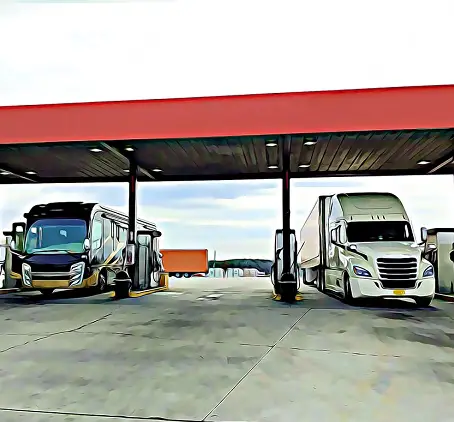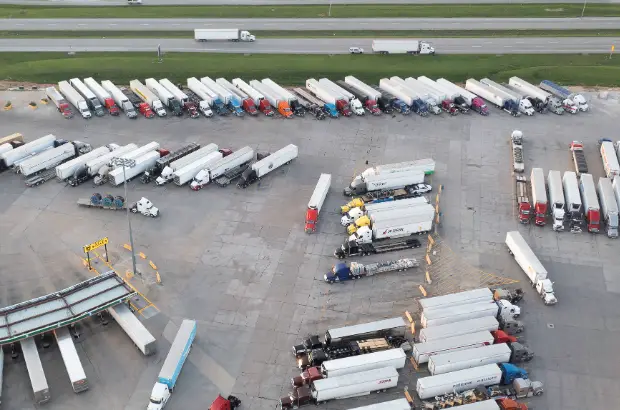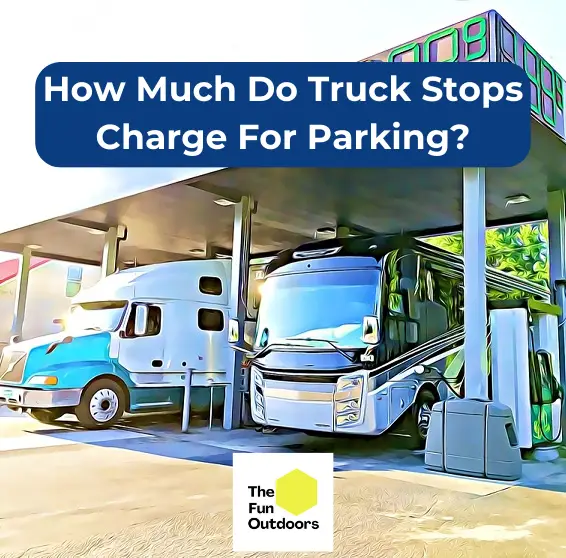RVers spend a lot of time on the road, and when it’s time to rest, they need a safe and secure place to park their rig. Truck stops are a popular option for RVers, but how much do truck stops charge for parking?
Truck stops charge between $10 to $20 per night for parking. Some truck stops charge a flat fee for parking, while others charge by the hour or by the day. Additionally, some truck stops offer discounts on parking for RVers who are AAA members or are a part of other associations.
How Much Do Truck Stops Charge For Parking?

Truck stops are a convenient place for truckers to park overnight or take a break during long hauls. However, parking at truck stops can come with a price tag.
The cost of parking at a truck stop varies depending on several factors such as location, amenities, and time of day.
According to a search result, the average cost of truck parking ranges from $10 to $20 per night, but some truck stops may charge up to $40 or more.
Some truck stops offer free parking for a limited time, usually up to two hours.
Parking fees may be waived if the driver purchases a certain amount of fuel or spends a certain amount of money at the truck stop.
Truck stop parking fees are not always straightforward.
Some truck stops charge different rates for different types of vehicles, such as tractor-trailers or RVs.
Additionally, some truck stops charge extra for amenities such as showers, Wi-Fi, or electricity hookups.
Some truck stops have designated parking areas for overnight stays, while others allow trucks to park in any available space.
It is important for truckers to follow the rules and regulations of each truck stop to avoid any fines or penalties.
Making a reservation ahead of time can be a good way to secure a spot at a truck stop and avoid the hassle of searching for a parking spot.
Some truck stop apps like TruckPark allow drivers to make reservations ahead of time and on-demand, but there is no additional charge that comes with using the app to make the reservation.
See Related: Free Overnight RV Parking: Our Top 30 Places
Specific Truck Stop Parking Rate Examples

Truck stop parking rates can vary depending on the location, amenities, and services offered. Here are a few specific examples of truck stop parking rates:
- Flying J: Flying J truck stops offer reserved parking for a fee of $15 per night. They also offer free parking for up to two hours. If the driver purchases at least 50 gallons of fuel, the parking fee is waived.
- Pilot: Pilot truck stops charge $15 per night for reserved parking. They also offer free parking for up to two hours, and the parking fee is waived if the driver purchases at least 50 gallons of fuel.
- NATSO: NATSO represents travel plazas and truck stops across the United States. While parking rates can vary, the average cost for overnight truck parking is between $10 to $20 per night.
- Travel Plaza: Travel plazas, like the ones found on major highways, offer truck parking for free. Parking at Travel Plaza is often limited and can fill up quickly. It’s important to plan ahead and arrive early to secure a spot.
- Other Truck Stops: Truck stops also offer free parking, but they may have limited spaces and fill up quickly. Some truck stops charge for reserved parking, with rates ranging from $10 to $30 per night.
It’s important to note that these rates are subject to change and may vary depending on the location and time of year. It’s always a good idea for truck drivers to research parking options ahead of time and plan accordingly.
Costs Involved

Truck parking fees vary depending on several factors. Here are some of the most important factors that can affect the cost of parking at truck stops:
Location and Time Factors
The location of the truck stop and the time of day or week can have a significant impact on parking rates.
For example, truck stops in urban areas or near major highways tend to charge more for parking than those in rural areas.
Moreover, parking rates may be higher during peak hours or on weekends when demand is high.
Amenities and Facilities Offered
Truck stops that offer more amenities and facilities usually charge higher parking rates. For instance, a truck stop that provides shower facilities, laundry services, and Wi-Fi may charge more for parking than one that only offers basic parking services
Some truck stops may offer discounts or free parking for drivers who purchase fuel or use other services.
Food and Fuel Services
Truck stops that provide food and fuel services may charge higher parking rates than those that don’t.
This is because these truck stops have to cover the cost of maintaining and operating these services.
However, some truck stops may offer discounts or loyalty programs that can help drivers save money on parking fees, so ask your truck stop about any options that can help you save a few bucks.
Safety and Security Measures
Truck stops that have more safety and security measures in place may charge higher parking rates.
For example, a truck stop that has security cameras, security guards, and gated parking may charge more for parking than one that doesn’t.
These safety measures can provide peace of mind for drivers and may be worth the extra cost.
Rewards and Discounts
Some truck stops offer rewards programs or discounts that can help drivers save money on parking fees.
For example, some truck stops may offer free parking for drivers who purchase a certain amount of fuel or use other services.
Others may offer discounts for members of trucking associations or other organizations.
Parking Rules and Regulations
Truck stops are privately owned properties, and as such, they have their own set of rules and regulations regarding parking.
It is important for truckers to be aware of the parking rules and regulations of the truck stop they plan to park at.
Some truck stops have specific parking areas designated for certain types of vehicles, such as RVs or refrigerated trucks.
Others may have restrictions on the length of time a truck can park in one spot.
Truckers should also be mindful of any signage indicating where they are allowed to park.
Some truck stops may have designated areas for overnight parking, while others may have specific areas for short-term parking or for drivers who are only stopping to use the restroom or grab a quick meal.
When parking at a truck stop, it is important for drivers to follow all posted rules and regulations.
Failure to do so may result in a ticket, fine, or even being towed.
Additionally, some truck stops may have security personnel or cameras to monitor the parking lot, so truckers should be mindful of their behavior and surroundings.
Alternative RV Parking Options
While truck stops are a convenient option for RV parking, they are not always the most cost-effective. Here are some alternative parking options that truck drivers may want to consider:
Rest Areas
Rest areas are a popular choice for RV drivers who need a quick break or a place to park for the night.
Most rest areas have designated RV parking areas, and they are usually free to use.
Note that some states have restrictions on how long trucks can park at rest areas. Be sure to check the rules before you park.
Walmart Parking Lots
Walmart parking lots are another popular option for truck drivers. Many Walmart stores allow overnight parking for RVs and trucks, and they are usually free to use.
Not all Walmart stores allow overnight parking, so be sure to check with the store manager before you park.
See Related: Can You Camp In A Wal-Mart Parking Lot?
Private Truck Stops
Private truck stops are another option for truck drivers who want to avoid the high cost of parking at a chain truck stop.
These truck stops are often owned by independent truckers or small businesses, and they may offer lower parking rates than chain truck stops.
Some private truck stops may also offer amenities like showers and laundry facilities.
Car Parking Lots
While it may not be the most convenient option, some truck drivers choose to park in car parking lots when they can’t find a spot at a truck stop.
Parking in a car parking lot may not be allowed, and you could be towed or fined. Be sure to check with the lot owner before you park.
Truck Stops and RVing
Truck stops can be a great option for RVers looking for a place to park overnight. While some truck stops charge for parking, others offer free parking for RVs.
Not all truck stops allow overnight RV parking, so it’s always a good idea to call ahead and confirm.
One advantage of parking at a truck stop is the availability of amenities. Many truck stops offer services such as showers, laundry facilities, and restaurants, which can be a welcome break for RVers on a long road trip.
Some truck stops also offer Wi-Fi and other amenities to make the stay more comfortable.
When parking at a truck stop, it’s important to be considerate of other drivers.
RVers should park in designated areas and avoid taking up multiple spots.
It’s also important to be mindful of noise levels, as truckers may be sleeping in nearby trucks.
Overall, parking at a truck stop can be a convenient and cost-effective option for RVers.
Just be sure to check ahead and confirm that overnight parking is allowed, and be respectful of other drivers while parked.See Related: Can I Use an RV Park as a Permanent Address?

